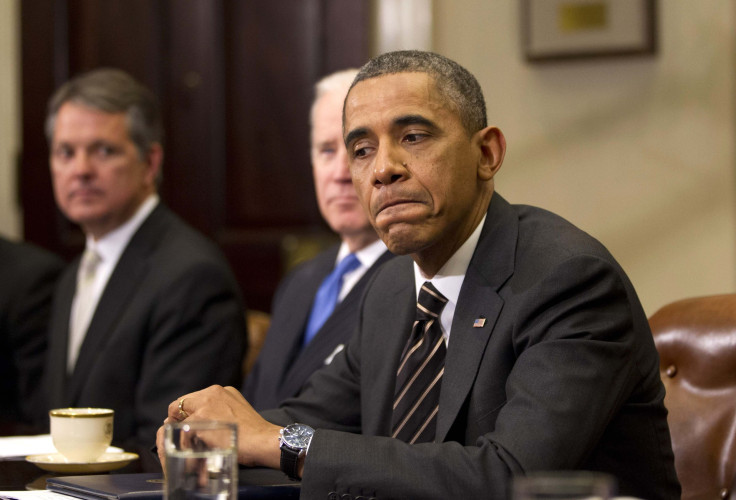Notable Scientific And Medical Retractions In 2013: The Top 5, From President Obama to Katie Couric

This year saw numerous medical views, statements, or publications get a lot of skeptical attention. Often, the end result was a big name in medicine, journalism, or politics having to acknowledge some kind of error. It’s always worth noting what people got wrong with the hope that such folly doesn't happen again. So here are five noteworthy instances of people having to eat their words in 2013:
5. Big Whoops In WHO Report
In a report about health disparities across Europe, the World Health Organization (WHO) included an eye-popping 2011 case study about the Greek financial crisis. “HIV rates and heroin use [rose] significantly,” the report said, “with about half of new HIV infections being self-inflicted to enable people to receive benefits of the equivalent of $955 per month and faster admission on to drug-substitution programs.”
A WHO spokesman explained that the report meant to say that intravenous drug users accounted for half of new infections in Greece, which jumped up by 52 percent in 2011. Apparently, “accounts of deliberate self-infection by a few individuals to obtain access to benefits” was based on “anecdotal evidence.” Ultimately, no specific examples were ever provided to show that users were intentionally infecting themselves.
4. Skewed Data On Body Symmetry
It’s not often the case that an author of a study eagerly wants to retract their research paper from a prestigious science journal. But Robert Trivers, an evolutionary biologist at Rutgers University, did. He finally got his wish this year.
The study looked at the role that dancing plays in sexual selection and found that Jamaican teenagers were more likely seen as good dancers, i.e., fit for reproduction, if their bodies were deemed more symmetrical. But Trivers realized that one of his co-authors falsified some data, which eventually ended with the retraction — after a drawn out ordeal.
3. Gupta Changes His Vote On Pot To ‘Yes’
In a 2009 article celebrity CNN medical correspondent, Sanjay Gupta, dismissed the science supporting medicinal marijuana as “unimpressive” — and patients who used marijuana as “malingerers … just looking to get high.”
But after speaking with medical experts, marijuana growers, and patients, Gupta did an about-face this year and expressed full support of the alternative treatment. “I didn't look hard enough, until now,” he wrote in a statement. “I didn't review papers from smaller labs in other countries doing some remarkable research, and I was too dismissive of the loud chorus of legitimate patients whose symptoms improved on cannabis.”
Gupta now questions the Drug Enforcement Administration’s reasoning behind lumping marijuana into the same category as other life-threatening drugs that are considered to have "no accepted medicinal use and a high potential for abuse."
2. Digging For Drama
The topic of HPV vaccines is akin to global warming in that there really isn’t any scientific controversy. But Katie Couric made it seem like there was in an episode of her show, Katie. Couric invited mothers to talk about how they suspected the vaccine harmed their daughters, while a medical expert said the vaccine’s protection could dissipate after five years.
This conflicted with what the Centers for Disease Control and Prevention (CDC) has found. As many as 57 million doses of the vaccine were given in the U.S. from June 2006 to March 2013, of which 22,000 led to girls and women experiencing adverse events. A vast majority (92 percent) of these were non-serious while the rest were essentially non-life threatening. The CDC has also never noted that protection from the vaccine could wear out.
“We simply spent too much time on the serious adverse events that have been reported in very rare cases following the vaccine,” Couric acknowledged in a blog. “More emphasis should have been given to the safety and efficacy of the HPV vaccines.”
1. “If you like your plan”
While the rollout of HealthCare.gov was springing leaks left and right and preventing people from signing up to a health plan, hundreds of thousands of Americans — if not millions — were being notified of their original coverage being cancelled. The fallout from this pushed President Obama to delay requiring people to jump onto a new plan that met Affordable Care Act standards.
“I completely get how upsetting this could be for a lot of Americans, particularly after hearing assurances from me that if they had a plan that they like they could keep it,” Obama conceded at a press conference. "There is no doubt that the way I put that forward unequivocally ended up not being accurate," he said.
A Pew Research/USA Today poll in early December found the percentage of people viewing Obama as "not trustworthy" increased by 15 points over the course of the year, from 30 percent to 45 percent.



























